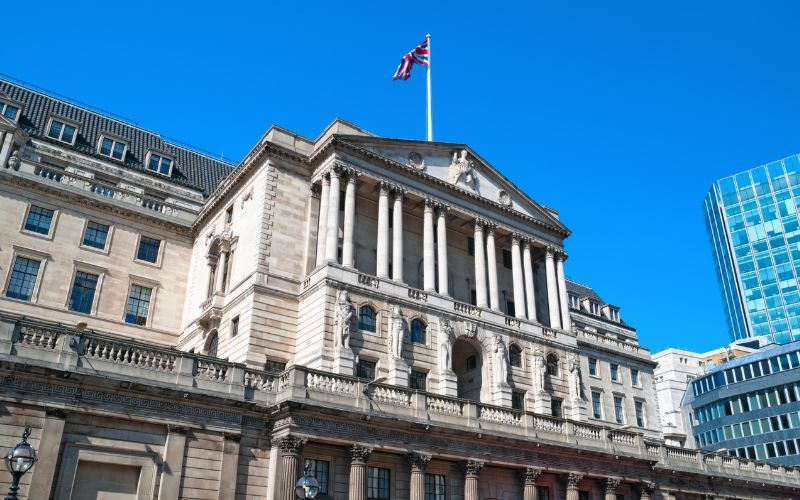Personal finance | 6 February 2025
Interesting times: planning for falling rates
A look at what high-net-worth individuals could consider to manage current conditions, and possible next steps for interest rates.

The Bank of England (BoE) lowered interest rates at its February meeting this week, bringing them to 4.5%. And while the future is never certain, the general consensus is that rates will fall further this year. Markets currently expect three more cuts in 2025. Whether or not that happens remains to be seen, but that’s the current outlook.
In the short term, lower interest rates usually have an immediate impact on mortgages, savings accounts and investments, but they can also have far wider implications for your wealth over time.
So while interest rates tend to move in small percentages, it’s important to look at their cumulative effect on your future finances. Then you can make wealth structuring decisions that serve your priorities for today and the years to come, as well as ensuring your money is eventually passed on in line with your wishes.
MANAGING CHANGING INTEREST RATES
Coutts Wealth Manager Phil James says it’s important to take time and carefully consider all your options when managing your wealth, especially when navigating changing conditions.
“When considering the long term, rushing into something without proper thought and planning could be detrimental to your finances,” he says. “We believe it’s better to take a breath, consider your priorities and make absolutely sure you’re getting your wealth strategy right for your needs.”
He adds, “There may be certain circumstances where it’s best to act quickly, if you’ve just had a major liquidity event like the proceeds from a business sale for example. And markets are always trying to stay ahead of interest rate changes so it could be worth ensuring your investments are well-positioned straight away.
“But overall, unlike when interest rates were below 1%, you are at least getting a return on your cash now while you build your long-term wealth strategy. And while cash might not always be the most effective way to grow your money ahead of inflation, current conditions do at least afford you some time to think about the future.”
MORE VIABLE OPTIONS FOR YOUR WEALTH STRATEGY
Phil stresses that, while interest rates have been falling, they remain higher than they were a few years ago. That means there are “more tools in your toolkit” to help you get the most from your wealth.
For a long time UK interest rates were very low – below 2% for 13 years from January 2009. This limited your options somewhat for growing your wealth over the long term. But today, with interest rates unlikely to return to those depths for the foreseeable future, there is greater choice when managing your money.
“During a period of ultra-low interest rates, many clients preferred to skew their asset allocation towards riskier assets,” explains Phil. “But asset classes that arguably looked less attractive then, such as government bonds, structured products, liquidity funds and cash, have become viable options again. They are all tools worth thinking about alongside stock market investing.”
Lower rates might change people’s attitude towards borrowing as well, Phil explains. They make it a potentially more attractive option to help fund that next big opportunity in your life – whether that’s your dream house or buying something you’re passionate about.
Eligibility criteria apply for our services. Fees and charges may apply. The value of investments and the income from them could fall as well as rise and you may not get back what you put in. Credit subject to status. Exclusions may apply. Over 18s only.
WHAT NEXT FOR UK INTEREST RATES?
Interest rates rose steadily from 0.1% in March 2020 to 5.25% in August 2023. Inflation started to rise partly because of supply chain issues and people spending surplus savings – both results of the Covid pandemic.
This meant the BoE wanted people to save their money rather than spend it to help slow rising prices. They therefore raised interest rates to make saving more attractive and borrowing more expensive.
But the situation has now changed.
Slow economic growth in the UK has contributed to inflation gradually cooling off, dropping to 2.5% for the 12 months to December. That’s down from the dizzying heights of 11.1% for the year to October 2022 – its highest level for 40 years.
This has enabled the country’s central bank to cut interest rates – carefully and cautiously – since last August. Markets expect further reductions because, although the UK economy is proving resilient, its sluggish growth is unlikely to impact rising prices. UK GDP was estimated to have risen by just 1% in the third quarter of 2024 compared to the same period the year before, according to the Office for National Statistics.
INTEREST RATES STILL EXPECTED TO FALL DESPITE STUBBORN INFLATION
Inflation has proved more stubborn than expected in its downwards journey, actually going back up occasionally last year. This was a key reason why this week’s BoE rate cut was only its third since last summer.
The UK central bank’s last Monetary Policy Report, published in November, said inflation could rise slightly to 2.75% this year, but it’s expected to fall back to the BoE’s 2% target after that.
Lilian Chovin, Head of Asset Allocation in Coutts’ investment team, says, “The UK is in a challenging position. Economic growth is weak but inflation, while much lower than it was, remains above the Bank of England’s 2% target. This makes it difficult for the central bank to cut rates by as much as it might want to as it attempts to support economic growth.
“While there is always going to be some uncertainty, the general consensus among markets is that UK interest rates WILL continue to fall – they might just take longer to drop and come to rest higher than initially thought.”
Lilian adds, “There are caveats of course. If economic growth became surprisingly weaker, we could see more rate cuts, and if inflation became stickier, we might see fewer cuts. But markets are currently pricing in three more reductions this year and predict that interest rates will land at around 3.75% by the end of 2025.”
One thing is more certain. Whether interest rates fall quickly, slowly or not at all, a solid, holistic, long-term plan for your wealth could benefit you and your family enormously.
Read our article ‘What to think about when interest rates drop’ for a more detailed breakdown of how lower interest rates might impact specific financial products. Savings, investments and borrowing all feature.
More insights






